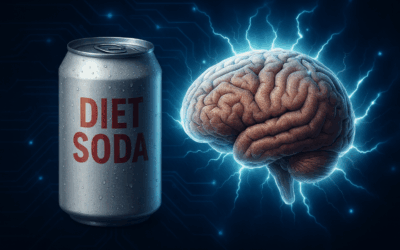RFKJ

Diet Soda Speeds Brain Aging, RFK Jr. Targets Additives
A new study published in the journal Neurology suggests that drinking diet soda every day may speed up brain aging. Researchers followed 12,772 adults in Brazil for eight years. They found that people who consumed the most artificial sweeteners had a much faster decline in memory and thinking skills. The results were striking. Heavy users showed a 62 percent faster decline. That decline equaled about 1.6 extra years of brain aging. The study looked at several popular sweeteners. These included aspartame, saccharin, acesulfame-K, erythritol, xylitol, and sorbitol. Tagatose was the only one that did not show harm. All the others were linked to measurable cognitive decline. New Study Published in @GreenJournal: Some sugar substitutes linked to faster cognitive decline. https://t.co/XcZJVtIGHC#AANscience #BrainHealth pic.twitter.com/FWCdtJg0es — American Academy of Neurology (@AANmember) September 4, 2025 Midlife Habits Matter The findings showed the strongest impact in adults under 60. People with diabetes were also more vulnerable. Older adults over 60 showed no major difference, but the researchers warned that habits in midlife set the stage for brain health later on. Cognitive decline often begins decades before symptoms appear. A loss of 1.6 years of brain function may not sound dramatic, but across a population it is significant. This makes diet choices in middle age especially important. People often believe switching to diet soda protects their health. The research shows the story may be more complicated. Artificial sweeteners may reduce sugar intake, but they could come with hidden risks. (RELATED NEWS: SNAP Soda Ban: Ending Taxpayer Junk Food Subsidies) What the Experts Say Claudia Kimie Suemoto, the study author and a neurologist at the University of São Paulo, explained that people often see artificial sweeteners as harmless. She said the results suggest they may not be harmless, especially with frequent use in midlife: “Low- and no-calorie sweeteners are often seen as a healthy alternative to sugar, however our findings suggest certain sweeteners may have negative effects on brain health over time,” Other physicians note that reducing sugar can still help some people. But they also encourage natural alternatives when possible. Not everyone agrees on the interpretation. Industry groups argue that these sweeteners remain safe. They point out that all of the common sweeteners studied are approved by the Food and Drug Administration. The Trump Administration’s Warning However, the Trump Administration’s “Make Our Children Healthy Again” Assessment, released in May 2025 by the Make America Healthy Again Commission, directly addressed these additives. The commission, chaired by HHS Secretary Robert F. Kennedy, Jr., stated: “Artificial sweeteners like aspartame, sucralose, and saccharin, used widely in diet sodas and sugar-free foods, have been observed to interfere with the gut microbiome in some studies. Gut microbiome shifts have been linked to obesity, metabolic issues, and possibly glucose intolerance. The classification of aspartame as possibly carcinogenic (Group 2B) by the International Agency for Research on Cancer (IARC) further complicates the understanding of these widely used substances, especially given the existence of conflicting research results.” Kennedy has made it clear that he is on a mission to bring these risks to light. His push is not just about raising awareness but about eliminating harmful additives from the American diet altogether. By targeting products that undermine metabolic and brain health, RFK Jr. has positioned this fight as central to protecting the next generation. Why This Matters The debate highlights a bigger question. What is the real cost of relying on artificial substitutes? Diet sodas and low-calorie snacks are everywhere. People turn to them to manage weight or blood sugar. Yet brain health may be part of the tradeoff. Studies like this raise awareness about long-term risks. They also remind us that brain aging is not just a concern for seniors. For people in their 40s and 50s, the choices made today may shape how sharp the mind feels at 70 or 80. The study adds to a growing body of evidence that diet and lifestyle strongly affect the brain. What You Can Do Experts recommend moderation above all. Cutting back on artificial sweeteners can lower risk. Reading labels helps, since many “monk fruit” or “stevia” products are mixed with other sweeteners like erythritol. Choosing whole foods, fruits, and naturally sweetened items offers a safer path. Exercise also plays a key role. Physical activity helps the brain produce protective proteins and supports memory. Good, healthy habits form a stronger shield for long-term health. (RELATED NEWS: Tracy Beanz Reveals MAHA’s Mission & What Comes Next In Fascinating Interview) The Bigger Picture Artificial sweeteners have already faced criticism. Some past research connected them to gut health problems and metabolic changes. Others raised questions about possible links to strokes or heart issues. While the science is not settled, the pattern is clear. When used in excess, these substitutes may not deliver the safe solution people expect. None of this means sugar is healthy. High sugar intake is a proven risk factor for diabetes, obesity, and heart disease. The challenge is replacing sugar. That leaves many people searching for better alternatives. Small amounts of honey, maple syrup, or fruit can satisfy a sweet craving without the same risks. A Wake-Up Call for Consumers The study’s authors stressed that their results show association, not cause. Still, the message is clear enough for everyday life. If you drink diet soda daily, it may be time to cut back. Brain health is precious, and the habits you build now may protect you later. This is not a call to panic. It is a reminder to stay alert and informed. Labels and marketing often sell artificial sweeteners as a free pass. Science now suggests the pass may come with hidden costs. The best steps are simple. Limit sweeteners, eat healthy foods, and stay active. Your brain depends on it. Cut through the noise. Drown out the spin. Deliver the truth. At The Modern Memo, we’re not here to soften the blow — we’re here to land it. The media plays defense for the powerful. We don’t. If you’re done with censorship, half-truths, and…

SNAP Soda Ban: Ending Taxpayer Junk Food Subsidies
The push to Make America Healthy Again (MAHA) has made significant strides with the signing of waivers by U.S. Secretary of Agriculture, Brooke Rollins. These waivers allow 12 states to ban the purchase of sugary drinks, candy, and desserts using Supplemental Nutrition Assistance Program (SNAP) vouchers, which are intended to help low-income families access nutritious food. This move marks a pivotal step in ending taxpayer subsidies for junk food. Six new states are joining the MAHA movement! Yesterday at the Great American Farmers Market, @secrollins and @seckennedy signed food choice state waivers for West Virginia , Florida, Colorado, Louisiana, Oklahoma and Texas to remove unhealthy foods from SNAP.… pic.twitter.com/Q8sAqaDBQP — Dept. of Agriculture (@USDA) August 5, 2025 A Bold Step in SNAP Reform These states have approval and are now set to remove high-calorie, nutrient-poor foods from SNAP: Florida, West Virginia, Colorado, Louisiana, Oklahoma, Texas, Utah, Iowa, Nebraska, Arkansas, Indiana, and Idaho. This reform comes amid President Trump’s broader initiative to tackle the nation’s rising health crisis and prioritize food quality. “The number one purchase by SNAP recipients is sugary drinks,” said Secretary Rollins. “SNAP is a supplemental NUTRITION program, meant to provide health food benefits to low-income families to supplement their grocery budget, so they can afford the nutritious food essential to health and well-being.” .@SecRollins announces the signing of waivers removing unhealthy foods from SNAP in six more states: “SNAP is a supplemental NUTRITION program meant to provide health food benefits to low income families… the law states it and @POTUS‘ @USDA plans to deliver on it.” pic.twitter.com/Mby4uoQIdu — Rapid Response 47 (@RapidResponse47) August 4, 2025 Despite the progress, implementing this policy at the federal level remains a challenge. Many lobbyists are fiercely advocating for the continuation of junk food eligibility, making it an uphill battle. Yet, the states are leading the charge, and 12 have now taken action, with 38 more to go. (RELATED: Tracy Beanz Reveals MAHA’s Mission & What Comes Next In Fascinating Interview) A Nationwide Call to Action Each state follows its own process to determine which foods are unhealthy and should be excluded. After this, they submit a formal request for approval from the USDA. The new food bans will take effect in 2026. The Trump administration is actively encouraging more states to apply for waivers, with each state playing a key role in shaping the future of SNAP. Health and Human Services Secretary Robert F. Kennedy, Jr. and U.S. Food and Drug Administration (FDA) Commissioner Dr. Marty Makary joined Rollins in announcing these waivers. Their support underscores the significance of this initiative in tackling the nation’s growing obesity and diabetes crisis. Ending the Sugar Subsidy Dr. Makary emphasized the importance of focusing on healthier alternatives to junk food, stating, “This begins the end of the government subsidization of our obesity, diabetes, insulin resistance epidemic.” He urged a national focus on the nutritional quality of food, rather than relying on medications to address the health crisis. “Forty percent of our nation’s kids now have a diagnosed chronic disease,” Dr. Makary added. “Thirty-one percent have diabetes, pre-diabetes, or insulin resistance. We have to talk about nutrients and fiber, not just Ozempic and other medications to medicate our nation.” Support for States and Local Leaders SNAP reform is a direct result of proactive state leadership. Governors from West Virginia, Florida, and other states have stepped up, requesting waivers and setting an example for the rest of the nation. Dr. Makary also praised the initiative, stating, “I hope to see all 50 states join this bold commonsense approach. For too long, the root causes of our chronic disease epidemic has been addressed with lip service only. It’s time for powerful changes to our nation’s SNAP program.” (MORE NEWS: Sweeney ‘Good Jeans’ Outrage Explained) What’s Next for MAHA? As the USDA and the Trump administration push forward with their efforts to reform SNAP, the question remains: Will other states follow suit? The battle is far from over. With 38 states still to act, the momentum needs to continue. But the steps taken up to this point have proven that meaningful change is possible. “It’s time for a change,” said RFK Jr. “And we’re seeing that change happen, state by state. We’re putting real food back at the center of SNAP, empowering states to lead the way in protecting public health.” Changing the Status Quo The fight to Make America Healthy Again is a real, tangible effort to reshape the way we view food, health, and public policy. With the signing of these waivers, we are witnessing the first steps toward a future where healthier food choices are accessible and where taxpayer dollars are spent wisely. As more states join this movement, the impact on public health could be profound. This is not just about banning soda and candy—it’s about changing the narrative around nutrition and ensuring that the poorest Americans are no longer subsidizing the very foods that contribute to chronic disease. The journey has just begun, but with the leadership of Secretary Rollins, Dr. Makary, and Secretary Kennedy, America is taking significant strides toward a healthier future. Forget the Headlines. Challenge the Script. Deliver the Truth. At The Modern Memo, we don’t tiptoe through talking points — we swing a machete through the media’s favorite lies. They protect power. We confront it. If you’re sick of censorship, narrative control, and being told what to think — stand with us. Share the story. Wake the people. Because truth dies in silence — and you weren’t made to stay quiet.

